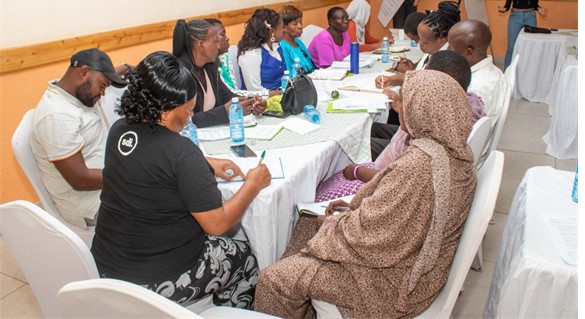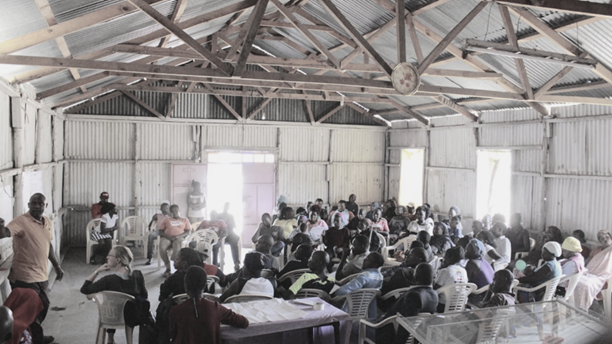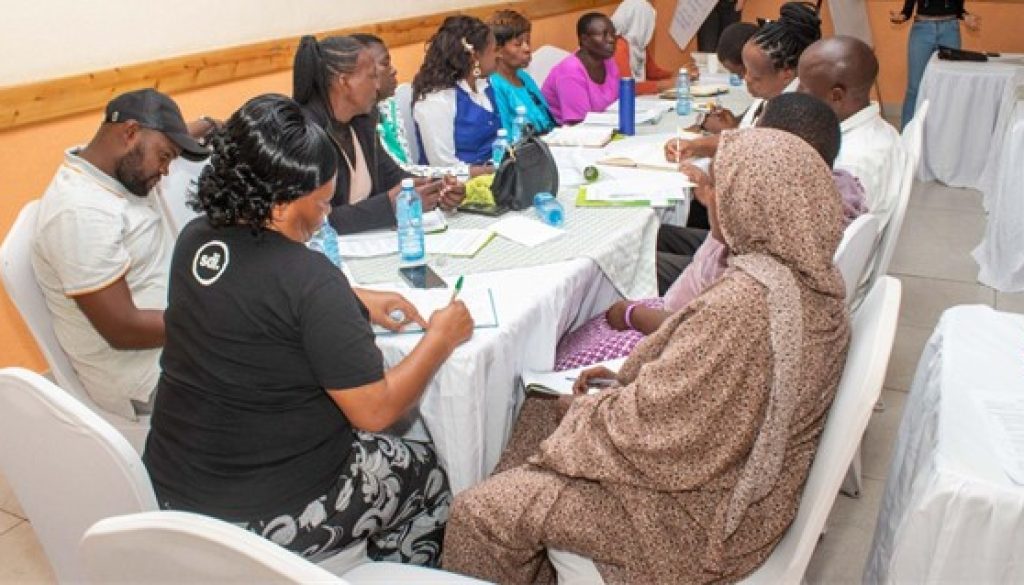Empowering co-researchers in Mukuru: A community-led approach
Kamila Gojobe (Muungano wa Wanavijiji Community organiser) reports back on a meeting between co-researchers in Nairobi on the participation of co-researchers in research projects.
Have you ever considered the unique perspective of the community before embarking on a research project? What does it take for community co-researchers to meaningfully participate in research, and what ensures that the research benefits the engaged community?
Shack Dwellers International Kenya and Muungano wa Wanavijiji, with the support of ARISE and the Liverpool School of Tropical Medicine Jean Clayton Fund, organised a workshop that brought together co-researchers from Mukuru and Mathare, two of the biggest informal settlements in Nairobi, Kenya. Together, they explored these questions from the viewpoint of those who are most affected – the community co-researchers.

Co-researchers workshop on capacity strengthening. The group discussion comprises co-researchers and Muungano wa Wanavijiji leaders from Mukuru.
This blog draws on a dialogue with co-researchers who articulated the gaps and opportunities they perceived in capacity strengthening in research, particularly in Mukuru. Co-researchers are local community members who provide support and hold local expertise, which they share and enhance throughout the research process. Before we delve into their insights, let us explore what the community envisions as a community-led process and the reasons behind their preference for it, using the Mukuru Special Planning Areas as an example.
Mukuru Special Planning Area
Mukuru is one of the largest informal settlements in Kenya, home to approximately 300,000 people. Like many informal settlements in Kenya, Mukuru faces numerous challenges, such as limited access to basic services—for example, lack of access to clean water, inadequate health services, sanitation, and secure, good-quality housing. This has prompted various organisations to take an interest in its development and community empowerment. Muungano wa Wanavijiji – the largest slum dwellers’ movement in Kenya – organised residents of Mukuru to identify and voice their challenges. Through Muungano wa Wanavijiji’s advocacy efforts with the people of Mukuru, it was finally declared a Special Planning Area (SPA) in August 2017.
Mukuru SPA is the largest informal settlement planning process that the city of Nairobi has ever undertaken. Its main focus is the development of an integrated plan with all eight sectors – Education, youth affairs, and culture; housing infrastructure and commerce; health services; water sanitation and energy; environment and natural resources; community engagement; – providing proposals on the upgrading process. It aimed to transform a 689-acre slum with some of Nairobi’s severest challenges into a healthy and functioning neighbourhood. The community participated in a community-led settlement-wide planning process in collaboration with the county government of Nairobi, Non-Governmental organizations, academic institutions, and other relevant stakeholders (47 organisations).
The upgrading of the informal settlement began with the community co researchers collecting data through settlement profiling, enumerations, and surveys at the household level. After the data collection process, a consortium of diverse partners across different sectors was established. The community designed their settlement proposals in the consortium by understanding the problems and possible solutions. They presented the designs to the government in relevant sectors, e.g., health solutions, to the Ministry of Health. Later, the government implemented various services that followed community designs. This is a prime example of a community-led process where the community owns and drives its agenda.

Mukuru SPA, a community consortium meeting taking place in Mukuru Viwandani.
How can we be more equitable and sustainably strengthen the capacity of co-researchers?
When talking to co-researchers about their engagement in different projects or community initiatives, they see this process, Mukuru SPA, as the best model to use in informal settlements. The co-researchers explained more about the opportunities they see in different projects, challenges, and recommendations for capacity strengthening for future engagement:
- Support and understand communities’ needs
Understand the community’s needs, support them in driving their agenda, and advocate for different issues. Ensuring the sustainability of projects requires careful planning, budgeting, and resource allocation for capacity-strengthening activities. Projects are often implemented without considering long-term benefits, reducing their lasting impact on the community. The co-researchers explained that before projects begin, it is important to sit with the community to understand if the project will be of importance to them, if there is a gap that the project will offer possible solutions for, and lastly, to involve them to ensure community ownership that will have a long-term impact. This will ensure sustainability, as the community will run it.
- Monitoring, evaluation and learning
Continuous learning and improvement are key to the long-term effectiveness and impact of any project. Many organisations overlook this, focusing more on project implementation than on monitoring, evaluation and learning. However, implementing a systematic follow-up process, led by the community and co-researchers, ensures that projects remain beneficial and adjustments are made as needed for ongoing improvement. By building the capacity of co-researchers to monitor, evaluate, and share learnings from projects, organisations can ensure that the community’s needs are being met and that the project is having the desired impact.
- Impact and sustainability
When engaging co-researchers, researchers often treat the process as a box-ticking exercise to achieve the project’s desired objectives. However, community co-researchers often do 80% of the data collection and validation as well as project on-ground implementation, and organisations should aim to enhance community skills and ensure project impact and sustainability in informal settlements. The co-researchers explained that there is often a missed opportunity to build connections among community groups, CBOs, and NGOs engaged in the space, which could enhance resource sharing and collaborative efforts. This would help leverage local skills and knowledge, ensuring project effectiveness and sustainability. Learning from other communities and institutions through, for example, mentorship and exchange programs, can provide valuable insights and enrich local initiatives. Forming partnerships with various stakeholders brings additional resources and expertise. Providing training programs empowers community members to take active roles in development initiatives, ensuring that the community drives its own progress and development.
- Awareness creation on ongoing and planned projects
Increasing awareness about ongoing and planned projects was also highlighted as ensuring community members understand the project, are able to make informed choices, and actively participate. Reviewing and adapting policies to reflect community needs and realities can create a more supportive environment for development initiatives.
- Recognition of co-researchers and community
Furthermore, recognition of co-researchers and participants in community projects – such as providing a certificate of participation and being given credit in project outputs – significantly enhances their future opportunities and motivation for participation. For example, being acknowledged by community members and administration officers opens employment opportunities, as it validates their contributions and skills. These steps can enhance the overall impact and sustainability of community projects.
In conclusion, co-researchers have strengthened their research capacity through different initiatives, and they have had the privilege to share their community knowledge and expertise on how to engage communities. This is critical to the development and community-led process. By addressing these challenges and seizing these opportunities, we can create a research environment that truly benefits the communities involved and the future of community-led processes.
